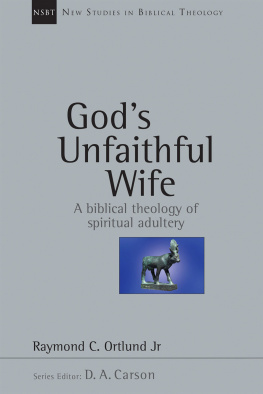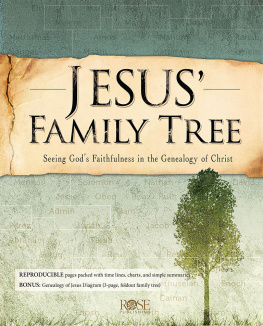Table of Contents
Landmarks
He Is Not Ashamed
What catches your eye?
We tend to be attracted to things that we desire. We notice and pursue what we value. We might say, out of the overflow of the heart, the eyes seek .
What do people esteem today? I live in Metro Boston, where education is highly regarded. In New York City, people value the financial industry. In Washington D.C., political power dominates the conversation. In Los Angeles, the entertainment industry holds sway. More broadly, especially in the West, if someone has any combination of wealth, success, or physical attractiveness, then they likely enjoy some degree of influence. Status turns heads. It catches our eye. Influential people like this are esteemed.
This means that for the majority of us, were on the outside looking in. Lets be honest. Were just ordinary, everyday people. Others walk by us on the sidewalk without a double take. Except by our family, friends, and co-workers, were easily overlooked. Whats so ironic is that we often look to those who have status and influence to give us meaning and purpose. We want to be like themusually because we want acceptance. We want a place to belong. We want our lives to count and have value. We dont want to be overlooked.
In light of this, its interesting to study the people Jesus noticed. As we consider this, we must remember that hes God. The implications of this truth are myriad. He needs nothing and owns everything. Nothing exists apart from him (Col. 1:16). Also, he has the highest honor. He is the radiance of the glory of God (Heb. 1:3). He has infinite riches, value, glory, and power. He has it all. He stands out. But who do we find him drawn to in his earthly ministry? Throughout his life, we see that his heart was inclined toward others who were easily overlooked. He was drawn to people who didnt usually turn heads.
This chapter will look at three categories of people that drew Jesus s attention: children, women, and the disabled. As we consider them, remember that Jesus never changes. Therefore, his heart in heaven remains like it was on earth. Those overlooked by many are not overlooked by him.
Let the Children Come to Me
In the first century, children were regarded as the least important members of society. They did not have any inherent status or power. The treatment of children fluctuated depending on how they might benefit their family. Roman law gave the father absolute power ( patria potestas ) over his familywhich extended to life and death. As late as A.D. 60, a son was put to death by the simple order of his father. Its not hard to imagine the harshness and cruelty that could occur in this environment.
The Israelites lived within this cultural atmosphere. Inasmuch as their perspective of children was shaped by the Scriptures, it was quite different. They knew that children were created in the image of God (Gen. 1:2627), knitted together in their mothers womb (Ps. 139:13), and given by God as a gift (Ps. 127:3). Children held inherent dignity and status because of their relationship to the Lord. God knew them, made them, and loved them. Children mattered. But, as is sadly often the case, even in our present day, ones biblical worldview can be corrupted by the surrounding unbelieving world. Like walking down a muddy path, you have to take care not to get soiled by your environment.
We find the tension between these two worldviews exposed in the Gospel narratives. In Mark 10:13, we read, And they were bringing children to him that he might touch them. Among the Jewish people, there was a custom of bringing children to great men to receive a blessing. This goes back at least to the time of Jacob when he blessed his sons and grandsons before his death (Gen. 48). Because of his unprecedented ministry and influence, a sizable crowd of people had now emerged before Jesus . You can imagine the scene of parents assembling with eyes and hearts full of anticipation, carrying their cooing and drooling children, waiting for the Lord to put his hands on their heads.
The disciples of Jesus responded to this scene with a rebuke (Mark 10:13). Were not given the reason for their actions. Still, we wouldnt be wandering too far out on a limb to suggest that they considered the children an unnecessary interruption in Jesus s day. We might even assume that their motives were commendable. They were probably trying to help Jesus .
The disciples harsh rebuke of the parents may have been rude, but it was not necessarily a shock in its first-century context. Instead, Jesus s response gets our attention. The disciples insensitivity provides an opportunity for us to see Christs heart. The disciples saw the children as insignificant, but he thinketh not so .
Jesus s response should get our attention. We read, But when Jesus saw it, he was indignant and said to them, Let the children come to me; do not hinder them, for to such belongs the kingdom of God (Mark 9:3637) in favor of convenience. They exhibited a worldly reflex that eclipsed a biblical priority. They overlooked those whom they deemed less significant. But, surprisingly, he thinketh not so .
We can learn a lot about people based on what angers them. Here we have a window into the heart of Christ. He has compassion for those who are weak. He defends the helpless. He stands up for the voiceless. He embraces the marginalized. His disciples erected a barricade, but he tore it down. He clears the road of opposition and paves it with an invitation: Let them come to me; do not hinder them. Invite them and do not prevent them.
Punctuating the statement, so that no one could misunderstand his point, Jesus took them in his arms and blessed them, laying his hands on them (10:16). You can imagine how the scene changed. In an instant, at the words and actions of Christ, the parents were relieved of feelings of rejection, disappointment, and insignificance. The children in their arms were not inconvenient or unimportant. They dont get in the way. In Jesus s eyes, they have dignity, value, and significance. Previously overlooked, they occupied center stage as an object lesson for the type of person that will enter the kingdom of God. The Lord rebuked a worldly philosophy that diminished children, while affirming their inherent value as divine image bearers. In that most riveting scene, we see the heart of Christ on display. He moves toward the marginalized. He loves the seemingly unimportant. With the rebuke of carnal men still ringing in their ears, these parents felt the heartbeat of Christ as he embraced their children. And we see a picture we should not soon forget, for, in due time, through his suffering upon the cross, the arms and hands of Jesus would again be a conduit of blessing to all who become like children and receive the kingdom of God.
And Also Some Women
When reading the Gospel accounts of the life and ministry of Jesus , a keen eye will note quite a few women written into the story. Just glance at the high points of Jesus s birth (Luke
But isnt this what wed expect to see if Jesus is the Savior of the whole worldof both men and women? In a world where people are trying to make their mark, Jesus came to make a mark on others. He came to make a new family in which peoples identity is derived from their acceptance by God rather than from other people. These cultural realities of a bygone age serve as suitable backgrounds on which to paint the beautiful portrait of grace. Whether his actions are deemed politically correct or not today, Jesus was not ashamed of any of his followers.
One of those scenes that gets our attention occurs in Lukes Gospel.
Soon afterward he went on through cities and villages, proclaiming and bringing the good news of the kingdom of God. And the twelve were with him, and also some women who had been healed of evil spirits and infirmities: Mary, called Magdalene, from whom seven demons had gone out, and Joanna, the wife of Chuza, Herods household manager, and Susanna, and many others, who provided for them out of their means. (Luke 8:13 )












